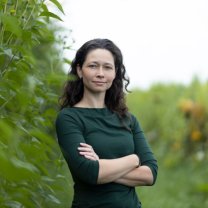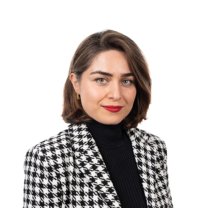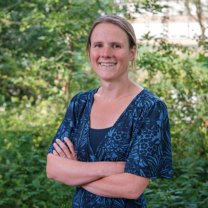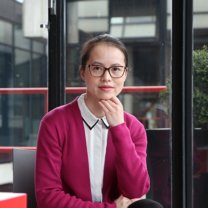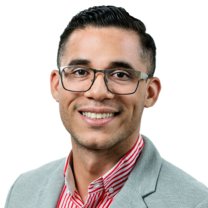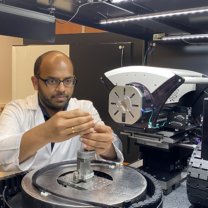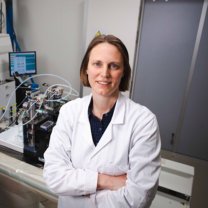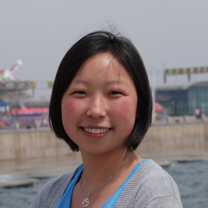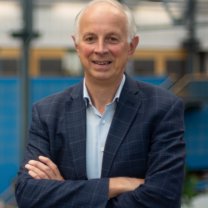In addition to an overview of our community in our research map, we highlight some of our scientists in this section “Meet Our Energizer”. Here you can find their personal stories behind the work that they do.
Cheryl de Boer, Director of the Climate Centre at the University of Twente.
Cheryl de Boer is originally from Canada but has Dutch origins, having Frisian grandparents who moved to Canada. After working as an engineer in manufacturing at Siemens Westinghouse, Cheryl came to the Netherlands to pursue a PhD at the University of Twente in the fields of governance, sustainability, and water management, career-wise a move towards policy development.
Regarding the energy transition, Cheryl says, “A lot of issues in the energy transition are spatially oriented, very concrete. However, I see a lack of connection with social use, governance, and social recognition. I aim to design decision-making and planning tools that include these aspects to address the reception of renewable energy sources in society.”
Read more about her goal as a strategic director for the Climate Centre at UTwente, in the full interview here.
Eli (Elham) Shirazi, assistant professor in the Advanced Manufacturing, Sustainable Products, and Energy Systems group at University of Twente (UT), member of the 4TU.Energy Advisory Board.
Eli (Elham) Shirazi, originally from Iran, holds a PhD in Electrical Engineering with a focus on smart grid control. She joined the University of Twente in 2021 after completing her post-doctoral research at the Department of Electrical Engineering at Katholieke Universiteit Leuven, Belgium. She has also worked at the Energy Department of IMEC in Belgium.
Eli's multidisciplinary research focuses on the modelling and control of energy systems: “My work aims to make our energy systems smarter and more efficient. Modern energy systems handle more diverse generation and load types with different dynamics and characteristics compared to traditional systems. In my work, I model these components to optimize the flows within the energy system.”
Read the interview with Eli here.
Annemiek ter Heijne, full professor and chairholder of the Environmental Technology group at Wageningen University & Research (WUR), member of the 4TU.Energy Advisory Board.
Annemiek ter Heijne is full professor and chairholder of the Environmental Technology group at Wageningen University & Research (WUR). Annemiek is a founding member of the Wageningen Energy Alliance (WEA) and member of the 4TU.Energy Advisory Board.
Annemiek’s work focuses on resource recovery technologies, which generally uses waste streams to extract valuable resources. In her vision and work, connection is a very important keyword.
Read the interview with Annemiek here.
Sha Lou, coordinator for 4TU.Energy
Sha Lou is from China and obtained her PhD in Biomedicine Application from Leiden University Medical Centre in 2016. She participated in a research project on Kidney-on-Chip for cure and care as a postdoc at Eindhoven University of Technology.
Since September 2022, Sha Lou is the coordinator for the 4TU.Energy centre. Her responsibilities are daily management and coordination of activities in 4TU.Energy and the collaboration with other knowledge centres. Find out why Sha choose to pursue a different direction in her career, read about the projects she works with today and how she masters the coordination puzzle.
Read the interview with Sha here.
Pedro Vergara Barrios, developing algorithms for planning and operation of electrical distribution networks, at a city level.
Pedro is from Colombia and four years ago, he moved to the Netherlands. He holds now a position as an Assistant Professor in the Intelligent Electrical Power Grids group at the Delft University of Technology, after working as a post doc in the Electrical Energy Systems group at the Eindhoven University of Technology.
Pedro's research topics are related to the development of algorithms and methods for control, operation and planning of electrical distribution networks with high penetration of low-carbon energy resources (for example, electrical vehicles, PV systems, electric heat pumps) using classical optimization and machine learning models.
Read the interview with Pedro here.
Keerthivasan Rajamani, working in the Thermal Engineering section
Keerthivasan works as an assistant professor in the faculty of Engineering Technology. He is from India and obtained his PhD in thermal engineering at the University of Twente, after obtaining his MSc degree at Delft University of Technology in mechanical engineering, specifically energy technology.
Keethi works in the field of Thermal Science and has been actively involved in 4TU. Energy community; he has got the best pitch prize thanks to his creative pitch skills. When he talks about his expectations for collaboration, Keerthi said he would love to see more small-scale meetings within the 4TU.Energy community in the future.
Read the interview with Keerti here.
Maartje Boon, research in the Reservoir Engineering section
Maartje Boon works in the Reservoir Engineering section in the department of Geoscience & Engineering at TU Delft, where she holds a postdoc position and leads the ADMIRE hydrogen lab. This is her second postdoc position, previously she was a postdoc at the Energy Resources Engineering department of Stanford University. She obtained a PhD in Petroleum Engineering from Imperial College London.
"What keeps me going is (...) the notion that the energy transition is accelerating. You see fluctuating energy prices, a high sense of urgency in energy supplies. Everyone is much more geared towards the energy transition. This makes it worthwhile to work on this research topic. What I also like about it, is that the challenge calls for a multi-disciplinary approach to come with solutions."
Read the interview with Maartje here.
Guanna Li, tenure-track researcher in Biobased Chemistry and Technology
Guanna Li is tenure-track researcher at Wageningen University in the field of chemistry. In her work Guanna constructs computational models to mimic the conversion of biomass fuel catalytic materials. Most of these catalytic materials are designed for fossil fuel conversion. For Guanna, her driving force is to make these input materials more renewable and to open up the black box of conversion.
“During my work I realised that if we want to transition from fossil fuels to renewable fuels with biobased chemistry, we need to do fundamental work on one hand, and work on applications in close collaboration with the industry on the other hand. This is where 4TU.Energy can play a role. My work in modelling the conversion process of catalytic materials is very fundamental, so I would like to team up with researchers who work with fuel production and I would like to connect with industry to optimize processes and reconstruct our energy systems.
Kornelis Blok, Energy Systems Analysis
“4TU.Energy should be a platform for young researchers!”, says prof. Kornelis Blok. Being a senior researcher, his advice is to develop a strong community offering researchers early in their careers an opportunity to meet fellow scientists outside of the usual habitat. The 4TU.Energy community offers inspiration and a certain freedom to explore new combinations of research that you might not easily have access to within the boundaries of a single university.
Kornelis Blok: “The motivation to collaborate should come from within. The research topics within 4TU.Energy and the diversity of energy research in the Netherlands give ample opportunities to explore and start these collaborations. We are here to provide basic support to get researchers started with testing ideas, support the organization of workshops and collaborative proposal writing."




